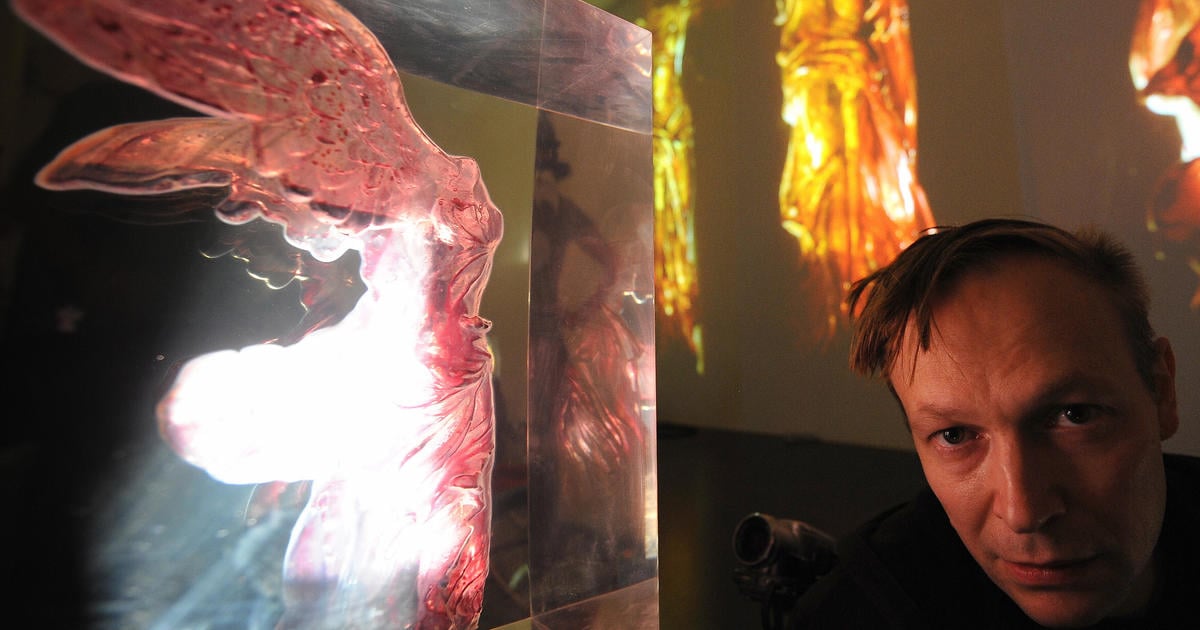Ok.
I mean, it sucks to see art destroyed, but I guess if you bought it, you can destroy it.
If that upsets you, then maybe we should reconsider allowing art to fall into the hands of wealthy collectors. If it should be preserved for future art lovers and historians, then to quote a great philosopher of our time, “It belongs in a museum.”
I don’t know what it has to do with Assange.
“To destroy art is much more taboo than to destroy the life of a person” - the artist doesn’t like how the world works and he wants to raise awareness. That’s what the connection is
I understand the meaning of the quote, but if this artist said he was going to execute hostages, that would be an entirely different conversation.
I think you might be missing the point. There is a life in danger, Assange’s. He’s forcing people to compare the value of human life to art. If he was executing hostages, you’d be comparing one human life to many.
Right, but to me there’s no comprison. Regardless of how you feel about Assange, a human life is more valuale than art, even priceless art from the great masters.
My response is “I’d rather you didn’t.” I’m not in a position to release Julian Assange, though, so whatever happens happens.
It depends on the country. In the US an artist has rights and deliberately destroying an artwork can get you sued.
Rembrandt, Picasso, and Warhol do not have any rights anymore. They have all died.
bravo
And how would that compare, for you, to Julian Assange if he dies in prison ?
If Julian Assange dies in prison, I would think he no longer has rights and any artwork he has created can be freely destroyed without fear of litigation, especially if it is privately owned.
Seriously. What does artwork have to do with Julian Assange? I don’t think he should be in prison but this is an odd protest.
If I had to choose one? I’d burn the art to save a life. If he died and the artwork was destroyed, I would think that was two tragedies.
These artists are all dead.
What’s the reason for that? Tried googling but couldn’t find anything on the reasoning for the law
>right to prevent distortion, mutilation, or modification that would prejudice the author’s honor or reputation
not exactly
Additionally, authors of works of “recognized stature” may prohibit intentional or grossly negligent destruction of a work.
The very next line after the one you you quoted. Also look at the case studies of times people have been sued successfully.
The fact this guy owns this art is actually kind of disappointing to me. I thought he was just picking a set of famous art and going rogue with it.
A terrorist, but instead of threatening blood only threatening the loss of priceless cultural artefacts. Going beyond mere property damage and loss of value, but still stopping short of violence.
Still a bold move on his part. More impressive, really. But somehow less exciting.
Considering he could make forgeries (considering he has the perfect reference) and destroy those, increasing the fame of those pieces, and their value should he save the original… Something tells me that there’s too much financial incentive not to pull a stunt like that and sell the real paintings later.
Do I have any proof that’s what’s happening? No. But it’s not unrealistic.
deleted by creator
In the long run, none of us truly owns anything. We all share the same fate, Assange and this clown included. It’s a shame that this clown is holding western culture hostage to his terrorist demands. If he destroys the works, he’s no different than the Taliban or ISIS destroying pre-Islam archeological discoveries.
deleted by creator
If you destroy privately owned art that the public couldn’t see, does it make a sound?
The concept of private ownership is weird, if you think about it. It’s like penguins collecting stones they’ve found and not letting anyone come close
When you describe it like that… I feel like it makes more sense. Like, of course the penguin is gonna want his safety stones. I buy that.
Private ownership of things made by people is perfectly reasonable; the person who made the thing should own it and be able to sell or transfer it as desired. So a rock you found isn’t made by people, so yeah, but a painting, or a chair, etc, was.
It’s land that wasn’t made by people where private ownership gets really ridiculous.
I can relate to that, but even in this manner, most of the goods made are the result of vast investments of time efort and money of lots of peoples over decades, just for few individuals to be the owners of.
(Btw, English is not my main language)
It is true that once production of an item becomes a greater task than simply the work of one person, the ownership of it can be considered more complex, but my point was that at least something created by people makes sense to be owned by its creator.
Well, under a free market economic system, each of those people is paid for their input to the thing, and only participates in that when they decide it’s worth their time to do so.
Only in frictionless spherical cow in a vacuum territory - that is to say in theory in unachievable ideal conditions. In the real world the market is wildly distorted and people are forced by a variety of external pressures to participate even if they don’t believe they are being offered what they are worth.
Only the owner (or shareholders) Researchers in universities, are getting paid by public funding from tax payers money (which is agood thing). Every major development is the product of lots of tiny developments and advansments in which the creators or inventors didn’t get their compensation from the end product. Workers in manufacturing are getting paid the least amount of compensation the owner can get away with, or even worse, manufacturing is moved to countries with even less protection for workers. Oh, and workers need protection from the owners.
But where to keep all my stuff asked the guy eternally renting?
But land is literally the first form of property. Territory is defended in life’s history long before any moveable object.
If anything, the conception of certain objects as being part of a person’s territory is the stranger step to take.
I kinda get the feeling that food was the first form of property. Land (by way of good shelter) was probably a close second with good rocks and sticks.
This point neither supports nor erodes the logic of ownership of territory or land; it merely points out that it has a very long history. Many things have a long history, some of which have consistent reason and logic behind them, and some which do not.
Yes a penguin that owns some stones would indeed not want other penguins grabbing them. Glad we’re on the same page with how private ownership works.
I think they’re talking about art specifically. Like what’s the point of owning art if you ain’t showing anyone? And why should anyone care if ou destroyed art you weren’t willing to show it anyways?
Thanks. Original art have some kind of intrinsic aura, by the art proccess itself. That’s the difference between arts and craft or even art and design. The fact that concept of having the right to destroy art just because you’ve paid someone, sound so obvious and natural to people is weird…
Yeah I know how it works. I said the concept is weird, but it benefit some share holders, so I guess we’ll have to live with it
“I’m gonna destroy my toy collection if someone dies in prison”
¯\_(ツ)_/¯ it’s not in the public sphere but your private collection, so you do you chap.
In my opinion privately owned art of a high enough cultural value should either not be allowed to be privately owned, or if it is then it should have to be on permanent loan to free admission public galleries. But that’s not the case.
Yeah more government intervention is what the world needs.
Yeah cause leaving companies and the super rich to self regulate has worked so well.
So now we want to spend tax payer money keeping track of art? Fuck that lol
Better than spending it giving tax breaks to the rich or subsidising companies that are destroying the planet.
But wealthy people need to buy those and store them in crates in overseas storage so they can dodge taxes!
Most are in museums where all kinds of people stand in line to see them.
That is absolutely not true. Museums themselves only display like 5-10% of their collection - the rest is locked away. Most art is in private storage
Oh, are you a museum curator? Do you know why they do that?
I am not but the museum stash is surely due to space! Can’t have every artifact on display or the museum would be the size of the city.
As for private collectors, work from famous artists rarely goes down in value…so rich people “invest” on storing thousands of paintings to make their finances look lower. It’s a tax evasion scheme honestly and the fact that it deprived people from seeing said works makes it even worse imo
to make their finances look lower. It’s a tax evasion scheme honestly
Buying art has the same effect on taxes as buying shares of Berkshire Hathaway, which is to say no effect at all until you sell.
Right, it’s defering gains. They are “storing value” and unlike stocks, depriving the world of art in the process
You can store value by buying gold instead, or just depositing money in a bank account.
Financially, buying art only makes sense if the value increases. And it might, but stocks are generally more likely to increase and therefore make a lot more sense than buying art.
In either case, buying them won’t reduce your taxes.
I want to learn also
First of all, you have to acknowledge there is a finite area for proper display. Secondly, this happens more in the artifact world than the fine art world. Third, not all parts of a collection are as good or even ready to display. Some are in need of restoration. Some are inferior to others on display. Lastly, museums like to rotate displays to help visitors see something fresh. All this doesn’t mean that museum storage areas are not interesting. The Smithsonian has a very interesting one which I was lucky to lost in when I was a child.
Thank you. Very informative.
Its an interesting point that some historical art being destroyed is more upsetting than a person dying. Of course if we’re going to make this point, why Assange, and not, say, Gazans?
why not both?
Warhol would probably approve of this, tbh
Oh no!
So anyway…
That’s a weird reason to give for it, like it’s obviously not going to change anything. The Justice system isn’t going to be held up by an artist threatening to destroy some paintings (and it could be years before Assange ever dies in prison), it seems like it’s being done as performance art. Pretty much like Banksy trying to destroy one of his works right after it was sold at auction, it’s being done for the attention/message of the act itself.
If there is more of a taboo around destroying art over human lives, it’s not for the sake of the “Art” itself, it’s for the sake of the arbitrary, yet quantitative value of money that those works have attached to them, because of how ridiculously inflated the price of artwork is (for money laundering purposes or whatever financial hijinks the wealthy are using artwork for). The historical value to humanity probably plays into it as well, but that’s not nearly as big a consideration. Otherwise though, you’ve got governments like the Taliban which will happily destroy history just as easily as they’ll kill people, that’s the kind of society we could have where art is given equal weight to human life.
Meanwhile, the people that our society deems worthy of death are people who don’t really have much income or wealth to their name. If you looked at the average wealth of individuals on death row or who have been executed in the US, it’s likely to be lower than the wealth of average Americans. So Art is valued more than human lives because, quantitatively, some pieces of art are probably worth more than some people would make in a lifetime.
Reminds me of the African billionaire that wanted to bury his cars to advocate for organ donation.
It’s a pretty well conceived piece of art, because it’s actually saying something and provoking a reaction. And it’s fascinating that it’s building on and dependent on other masterpieces.
I love the way the comment above you translated your comment for the young’uns, and just says “Based”
Seems kinda pointless, I don’t think anyone involved in deciding whether or not Assange dies in prison would change anything due to this.
I imagine the point is to raise awareness of Assange’s position with people who care about the artworks, in an attempt to inspire others to campaign for his fair treatment.
I wonder if they might now get involved, though. This is the kind of thing that makes it to the cocktail party circuit chatter.
But like really, would anyone pardon a crime because they were being blackmailed with the destruction of art? Would a parole judge really take that into consideration? Seems more likely to me it would make them less likely to help Assange for fear that it looks like the threat worked, but most likely of all they would just continue based on the law and ignore this guy.
No of course it wouldn’t enter into it at all except that it gets people talking and taking sides. Suddenly it’s news again, and public opinion does matter.
cool film it
I think a lot of us only roughly remember the details (or didn’t follow the later revelations) about Assange. My memory was weak, too, so here is a short refresher (with links!)
Pre 2015 Wikileaks did ethical releases of leaked information (vouched; cleaned of names and details that would expose individuals to danger) and exposed generally diplomatic and military-industrial dirt.
Trump Campaign Assange and thus Wikileaks sided with the GOP. Wikileaks had a line to Trump’s campaign team. They also sat on a trove of DNC E-Mails provided by Russian hackers. Wikileaks timed releases to blot out news that could hurt Trump. In one case, the Trump campaign urgently asked for a leak and got Wikileaks to act within 30 minutes. Wikileaks also refused to publish leaks harming Russia.
From the private chat logs (more in the Business Insider article linekd above), some things Assange said to his, until then, progressive aides
Assange: “We believe it would be much better for GOP to win. Dems+Media+liberals woudl [sic] then form a block to reign in their worst qualities.”
Assange: “Russia is absolutely terrified. Kalingrad, Crimea, and its only foreign naval base, Syria are all under threat and are not protected by Russia’s strategic depth. Meanwhile the US hacks the hell out of it”
It looks to me like Assange got suckered in by Russian propaganda rather than sell out intentionally, but that’s just my own guess.
Rape Charges In Sweden, he used his fame to obtain sex from two women, both times trying to refuse condoms. He was creepy and pushy with both. Woman A suspected he manipulated his condom. Woman B woke up in the night to find Assange had climbed on top of her for “second servings” without asking and had penetrated her without a condom.
From my own memory: neither woman went to the police, but when they talked about it (to press?), a public prosecutor in Sweden was duty-bound to start a rape investigation.
It gets too messy from there. The US had an interest in Assange’s extradition and may have plausibly exerted pressure. The women received threats and hate. Russia fanned the flames under everything to fuel division and turn more Wikileaks supporters against the US.
The rest is history. I don’t know where to stand. Assange and Wikileaks were once forces for good. But, in my opinion, he got played, never realized or never admitted to it, and is now just another lackey aiding Russia.
I think we can separate the question of whether he ended up working for Russia from the question of how to treat him fairly. If we would want a certain level of humane treatment for a journalist publishing leaked information, that should apply whether or not we approve of the agenda behind what they’re doing, and whether or not we think they’re being played.
He’s a journalist and a political prisoner.
Who can say where one should stand? 🤷♂️
If these art pieces are in a private collection that can’t be enjoyed by everyone already: Was anything of value to culture really lost? 🤔
Would the very fact that destroying them would be meaningful, as well as publicly documented, be more artisticly valuable than keeping the artwork locked up in a vault?
A lot of the art that is currently in museums was once donated by a private collector. Many private collectors will also lend their art to museums for special exhibitions.
Some art in private collections stays private but once it’s been destroyed there’s no chance it will ever get to the public.
Extremely short sighted view of reality.
At the current rate it is almost certain that Assange will, eventually, die in prison. Instead the collector should set a timer on it so that the art is destroyed if Assange is not released by a certain date.
Perhaps that date is Julian Assange’s natural lifespan?
Sorry, we don’t negotiate with performance art terrorists.










